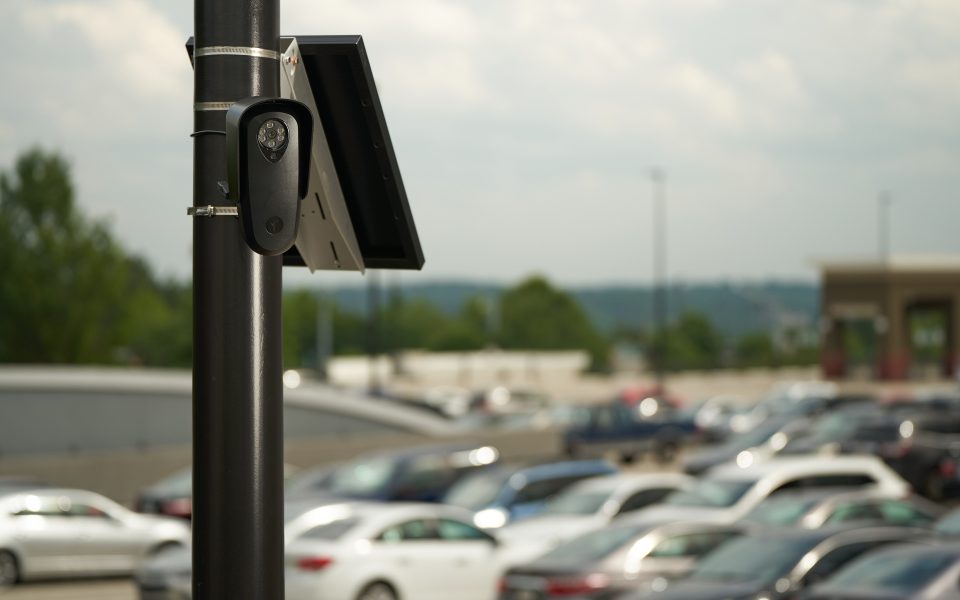Some Winston-Salem residents are apprehensive about the 25 new license-plate cameras that will soon be installed across the city.
On Jan. 3 Winston-Salem City Council approved an agreement to allow the installation of 25 automated license-plate readers by surveillance-technology company Flock Safety at various locations throughout the city. These cameras will capture images of license plates on vehicles passing through intersections across all eight wards, to be used as part of a pilot program with the Winston-Salem Police Department.
Katharina DiMov was shopping at Aldi’s near Brewer Road and Peters Creek Parkway when she learned about a camera coming to the intersection.
“That’s my main question: How else can it and will it be used if they see fit to use it in a different way?” DiMov said.

According to the police and other city officials, the cameras are used to compare license plates to find stolen cars or cars driven by people suspected of being involved in criminal activities. They can also use them to search for a registered owner’s name and find their license plate.
However, paired with human error, license-plate cameras used by police could contribute to mistaken-identity arrests. And they have: right down the road in Charlotte. In June 2021 Charlotte-Mecklenburg police officers handcuffed teacher Jasmine Horne at gunpoint due to a slip-up involving license-plate readers, mistaking her for a suspect in a stabbing. When the victim gave police the name of the person who stabbed them, police misspelled it when they entered it into the system. Police then followed the car with the license plate linked to that name, leading them to Horne’s home, where they arrested her on the spot. The actual suspect, Jaselyn Horne, was taken into custody later on. CMPD Chief Johnny Jennings decided not to discipline any of the officers involved despite the distress that Jasmine Horne endured as a result of their mistake, according to news reports.
Flock Safety cameras already roost in other neighboring cities like Greensboro, where 25 license-plate readers were deployed around town last year.
In an email to TCB regarding the changes produced by the license-plate readers, Greensboro police Lt. RB Todd wrote: “The LPRs have certainly helped to develop leads that we may have never gained without them.”
At the corner of Westbrook Plaza Drive and Stratford Road, Antonio Aguilar shared his opinions about the cameras while perusing items in Walgreens.
“If it might help out a case, then sure I’d say go for it,” he said. “I wouldn’t be too against it, but I wouldn’t be shouting from the rooftops saying, ‘Hey, we should have license-plate readers!’”

In a previous article, TCB reported that after 30 days, footage captured from the surveillance cameras will be permanently deleted if not being used in an active investigation. But that means taking police at their word, Aguilar said.
“They could say one thing but then really just be doing something else,” he said. “Otherwise I’d say I’d be okay with it…”
While taking a walk along Broad Street, Jerry Davis also had questions about how the new cameras would be used.
“What are they using it for?” he asked. “Are they using them for…speeding, running stop signs?”
According to the city, the cameras are only intended for capturing images of license plates and other markers such as make, model, color and license plate of a vehicle, plus features like roof racks and bumper stickers. They do not have facial recognition technology. However, as reported by TCB in the past, other police technologies that did not capture personally identifiable information were still used to track individuals down.
According to a 2021 Vice investigation, Flock Safety cameras have the capability to be used to scan license plates for immigration purposes. In the article, Flock CEO Garrett Langley told Motherboard, “Yes, if it was legal in a state, we would not be in a position to stop them,” he said. “We give our customers the tools to decide and let them go from there,” Langley elaborated.
And broad use of the technology concerns Davis.
“I can’t say that I’m really a fan of that; it’s an invasion of privacy,” he said.
During the one-year pilot, the cameras will be offered to the WSPd for free. Once the year is up, WSPD will evaluate the success of the program and decide whether to develop a proposal to bring to the city council. According to Flock Safety’s website, their license-plate reading cameras cost $2,500 each per year.
“See, and the taxpayers will foot the bill for that,” Davis said.
All CityBeat reporting content is made possible by a grant from the NC Local News Lab Fund, available to republish for free by any news outlet who cares to use it. Learn More ↗
Republish this storyJoin the First Amendment Society, a membership that goes directly to funding TCB‘s newsroom.
We believe that reporting can save the world.
The TCB First Amendment Society recognizes the vital role of a free, unfettered press with a bundling of local experiences designed to build community, and unique engagements with our newsroom that will help you understand, and shape, local journalism’s critical role in uplifting the people in our cities.
All revenue goes directly into the newsroom as reporters’ salaries and freelance commissions.


Leave a Reply